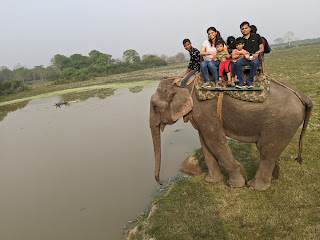The Blind Men and the Elephant (Short Story)
 |
Disclaimer- This a parable from India that has been adapted by many religions and published in various stories for adults and children.
There were once six blind men who stood by the road-side every day, and begged from the people who passed. They had often heard of elephants, but they had never seen one; for, being blind, how could they?
It so happened one morning that an elephant was driven down the road where they stood. When they were told that the great beast was before them, they asked the driver to let him stop so that they might see him.
Of course they could not see him with their eyes; but they thought that by touching him they could learn just what kind of animal he was.
The first one happened to put his hand on the elephant's side.
"Well, well!" he said, "now I know all about this beast. He is exactly like a wall."
The second felt only of the elephant's tusk.
"My brother," he said, "you are mistaken. He is not at all like a wall. He is round and smooth and sharp. He is more like a spear than anything else."
The third happened to take hold of the elephant's trunk.
"Both of you are wrong," he said. "Anybody who knows anything can see that this elephant is like a snake."
The fourth reached out his arms, and grasped one of the elephant's legs.
"Oh, how blind you are!" he said. "It is very plain to me that he is round and tall like a tree."
The fifth was a very tall man, and he chanced to take hold of the elephant's ear.
"The blindest man ought to know that this beast is not like any of the things that you name," he said. "He is exactly like a huge fan."
The sixth was very blind indeed, and it was some time before he could find the elephant at all. At last he seized the animal's tail.
"O foolish fellows!" he cried. "You surely have lost your senses. This elephant is not like a wall, or a spear, or a snake, or a tree; neither is he like a fan. But any man with a particle of sense can see that he is exactly like a rope."
Then the elephant moved on, and the six blind men sat by the roadside all day, and quarreled about him. Each believed that he knew just how the animal looked; and each called the others hard names because they did not agree with him.
People who have eyes sometimes act as foolishly.
As Rig Veda states- Reality is one, though wise men speak of it variously. The moral of the parable is that humans have a tendency to claim absolute truth based on their limited, subjective experience as they ignore other people's limited, subjective experiences which may be equally true.


True it is.
ReplyDeleteThanks for the read.
DeleteTrue
ReplyDeleteThanks for the read
DeleteDear Ekta,
ReplyDeleteA very good weekend read on everyone's elephant concepts and then spending Time and energy in justifying and expecting all others to agree his definition of an elephant.
There are further two ways of taking it : One Let me live with my image of elephant and you live with yours. Two Open up a bit and try to understand other person's definition of elephant.
Since there are 2 ways surely some will take 1 and the rest 2, depending upon their own perception gained through their life experiences, learnings, upbringings etc.
With out judging anyone, both are Okay at their place. When we (ALL) reach this level of maturity, there won't be any confusion, miscommunication, disturbances in our lives.
However since we all are so engrossed in our daily routines, we seek these clarity in thoughts through more learned/experts in the fields whom we call by different names in the society - Guruji/ Mataji/Shri shri....etc etc.
Now personally speaking when situation arises in front of me to see MY Elephant, I detach myself from the current position and look at it from a different angle to understand the impact of my action, in long term say 3,5'10'20'30'50 years. Or I go and park myself somewhere above globe/other planet/galaxy/Space station and look at the situation differently through distance/time. Most of the time I get clarity of thoughts and actions to be taken, which I call as AWARENESS. Then being AWARE I take any action/decision, which allows me to a point of No Regrets later.
Example : Killing a person is not justified anywhere in the world, but if it's a war, and you do so, and more you do it, you are rewarded with Medals.
Difference is Awareness of your actions. Here a soldier going to war is aware what he's doing or supposed to do, which otherwise in normal life he won't.
This results in to NO REGRETS later in Life.
So dear Erika, I hope someday I would understand and see with my eyes your Elephant and I wish I would reciprocate the same way.
Ooh wao, sir. You understood the story and made me understand it on a more practical level.
DeleteFor me...when my elephant begins to accumulate ... I just think of myself on death bed and see if the elephant is important or not.
Thanks for the read.
True 👍🏻
ReplyDelete
ReplyDeleteWhen we go to a theatre to witness a drama, dance or a music programme, we tend to opt for front seats. However, when watching a film on screen, we normally opt for rear seats. Our position in life is only relative, not absolute.
For making soap, oil is required. But to clean oil, soap is required. This is the irony of life. Only two categories of people are happy in life namely, The Mad and The Child. We need to be Mad to achieve a goal. We need to be a Child to enjoy what we have achieved.
We cannot hug our self nor can we cry on our own shoulder. We always need someone to hug us. We need someone’s shoulder to cry on. Life is all about living for one another. So, we need to live with those who love us the most.
Relations cannot be understood by the language of money because, some investments never give profit but they make us rich! So, let’s enjoy the life!!